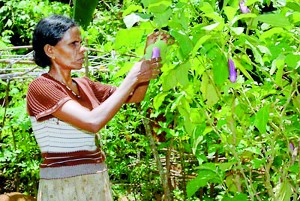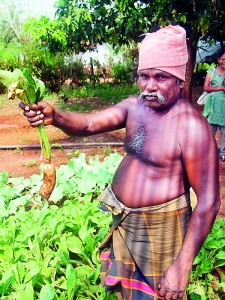Sustainable Development in Action : Remediation of Farmlands in the Arid Zone of Sri Lanka
View(s):Sustainable Development was a focal point for Save Green with ET a few weeks ago, this week we will take a look at real life implementations of sustainable development initiatives taking place, in Sri Lanka. This article is about one such sustainable agricultural development initiative taking place in the arid zone of Sri Lanka, specifically in the areas of Polonnaruwa and Vavuniya.

Diversification of Home Gardens
Farmer resilience in the dry zone of Sri Lanka is mainly dependent upon basic factors such as water security, soil fertility and market oriented production. However, the use of unsustainable high input agriculture practices have directly affected the dry zone soil condition, making them infertile and rendering the soil no longer usable without increased input of external energy sources. The soil fertility and water security of dry zone farming are also deeply linked to the natural forests. In recent years, deforestation has become a common site in many rapidly growing towns. Deforestation has reduced the ground water quality and availability due to gradual reduction of the watersheds in the area. Further exacerbating these issues is conventional high input farming, which has led to an increase of heavy metals in ground water causing issues such as an epidemic of renal failure in the north and east of Sri Lanka – which many of us have heard and read about.
Furthermore, with the introduction of “grow more “ programmes that are reliant on the use of chemicals –which may have residual effects, the increased use of hybridized seeds, in turn significantly increases the area subjected to monoculture farming systems.
Though it shows higher progress at an initial stage – with a bountiful crop and economic benefits, in the long term it creates a vast number of issues, which in turn demand high chemical inputs for degraded soils and plants are more susceptible to diseases and environmental changes.
In order to combat these problems faced by dry zone farmers, immediate measures such as the use of sustainable farming practices, promotion of traditional seeds having good genetics and enhancing natural resources needed for farming – need to be taken to be implemented to secure the farmers’ future and long term viability of the soil.
It is with the objective of minimizing the above stated negative impacts of unsustainable agriculture and deforestation that the Rainforest Rescue International developed a special program to be implemented in Polonnaruwa and Vaunia districts with a special focus on war affected farming communities. The program is currently implemented in 9 Grama Niladari Divisions in Vengalacheddikulum Divisional Secretariat Division in Vavunia district. The program a further aimed to improve the resilience of farming communities and to establish new markets for the community’s agricultural products. The program was implemented by the Rainforest Rescue International, a non-governmental organisation working towards a  sustainable managed world, with the support of the European Union and Oxfam Italia. The programme is supported locally by District Secretariat, Divisional Secretariats and Agrarian Services Department and Agriculture Department, etc
sustainable managed world, with the support of the European Union and Oxfam Italia. The programme is supported locally by District Secretariat, Divisional Secretariats and Agrarian Services Department and Agriculture Department, etc
The program works with 835 homes containing a total of 450 hectares of ‘home gardens’ which are developed as Forest Market Gardens. The gardens were developed by the promotion of tree cropping, organic agriculture and also crop diversification which are addressed through principles of Analog forestry. The development of a central seed bank will enable the supply of locally appropriate seeds at a low cost to 2000 beneficiary farmers in both Polonnaruwa and Vavunia district and hence develops sustainable a farmer to farmer seed saving program.

The First Crop
The long terms objectives of this program include increased average disposable income of the local community through improved knowledge, improved market access and through income diversification and improve the farmers’ access to a sustainable community driven agricultural extension and seed delivery service. Sustainable development initiatives such as this are necessary in the maintenance and long term development of the agricultural
industry. The unique aspect of this program is that all vegetables and fruits produced from these ‘home gardens’ are free from pesticides and fertilisers and are truly natural and healthy foods for consumption.
Show your support for sustainable development initiatives that also make a significant contribution towards these marginalised and vulnerable farming communities in the development of their skills, knowledge and financial income, the produce from this sustainable development initiative can be found every Thursday at Rainforest Foods, located at The Good Market, Diyatha Uyana, Battaramulla. Be there and show your support for a better, sustainably managed tomorrow.
Joanne Kotelawala (British Council International Climate Champion 2010, British Council Active Citizens Facilitator and Past President of Green Army of Spectrum Institute of Science and Technology).
Do you have any comments/ideas/suggestions/pictures/writings you would like to share?
Then send an email to savegreenwithet@gmail.com
Follow @timesonlinelk
comments powered by Disqus
















